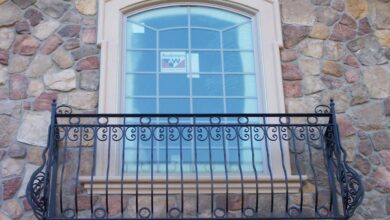Mortgage in France A Comprehensive Guide
Mortgage in France can seem daunting, but understanding the process is key to securing your dream home. This guide navigates the intricacies of French mortgages, from the various types available – fixed-rate, variable-rate, interest-only – to the crucial application process and the factors influencing approval. We’ll explore the legal landscape, the role of notaries, and even the common pitfalls to avoid.
Whether you’re a first-time buyer or an experienced investor, this comprehensive overview will empower you to make informed decisions.
We’ll cover everything from calculating your debt-to-income ratio and understanding interest rate fluctuations to finding a reputable mortgage broker and navigating the tax implications of homeownership in France. By the end, you’ll be well-equipped to confidently navigate the French mortgage market and secure the financing you need.
Types of Mortgages in France
Securing a mortgage in France involves understanding the various loan types available. The French mortgage market offers a range of options, each with its own set of advantages and disadvantages. Choosing the right mortgage depends heavily on your individual financial situation, risk tolerance, and long-term financial goals.
Fixed-Rate Mortgages
Fixed-rate mortgages, orprêt immobilier à taux fixe*, offer predictable monthly payments throughout the loan term. The interest rate remains constant, providing borrowers with financial stability and allowing for easier budgeting. This predictability is a significant advantage, especially during periods of economic uncertainty. However, fixed-rate mortgages may not always offer the lowest initial interest rate compared to variable-rate mortgages, especially in periods of low interest rates.
Getting a mortgage in France can be a complex process, especially with fluctuating global economic conditions. Understanding broader economic impacts, like the effect of fuel price hikes on inflation, as detailed in this article on the Indonesian fuel price increase Dampak kenaikan harga BBM Pertamina Patra Niaga terhadap ekonomi , is crucial. These kinds of events can indirectly influence interest rates and overall mortgage availability in France, making careful planning even more important for prospective homebuyers.
Variable-Rate Mortgages
Variable-rate mortgages, orprêt immobilier à taux variable*, are linked to a benchmark interest rate, such as the Euribor. This means your monthly payments can fluctuate based on changes in the benchmark rate. The advantage is that variable-rate mortgages often start with lower interest rates than fixed-rate mortgages. However, the risk is that your monthly payments could increase significantly if the benchmark rate rises, potentially leading to financial strain.
Interest-Only Mortgages
Interest-only mortgages, while less common in France than fixed or variable-rate options, allow borrowers to pay only the interest on the loan for a set period. This results in lower initial monthly payments. However, at the end of the interest-only period, the entire principal loan amount remains outstanding, requiring a significant lump sum repayment or refinancing. This approach requires careful planning and a clear strategy for repaying the principal before the end of the term.
Table Comparing Mortgage Types
| Mortgage Type | Interest Rate Type | Typical Loan Term | Key Features |
|---|---|---|---|
| Fixed-Rate Mortgage | Fixed | 15-25 years | Predictable payments, financial stability, easier budgeting, potentially higher initial interest rate. |
| Variable-Rate Mortgage | Variable (linked to benchmark rate) | 15-25 years | Potentially lower initial interest rate, fluctuating payments, higher risk of increased payments. |
| Interest-Only Mortgage | Variable or Fixed | Typically shorter initial term, followed by repayment of principal | Lower initial payments, significant principal repayment required at the end of the interest-only period. |
Mortgage Application Process in France
Securing a mortgage in France involves a multi-step process that requires careful preparation and thorough documentation. The process can seem complex, but understanding the steps involved will significantly streamline your application. This section details the key stages and necessary documentation to successfully navigate the French mortgage system.
Required Documentation for a Mortgage Application
Gathering the necessary documentation is a crucial first step. Lenders in France require extensive verification of your financial situation and the property you intend to purchase. Incomplete or inaccurate documentation can significantly delay the process or even lead to rejection. It’s advisable to organize all documents well in advance.
- Proof of Identity and Residency: This typically includes a passport or national identity card, and proof of your current address in France (utility bills, rental agreement).
- Proof of Income: This is arguably the most critical element. You’ll need to provide payslips for the past three to six months, tax returns for the previous two years, and possibly employment contracts. Self-employed individuals will need to provide business registration documents and financial statements.
- Credit Report: A French credit report ( fichier de solvabilité) is essential. This document details your credit history and allows the lender to assess your creditworthiness.
- Property Documents: Documents related to the property you wish to purchase are vital. This includes the compromis de vente (sales agreement), the property’s energy performance certificate ( Diagnostic de Performance Energétique or DPE), and potentially other surveys or reports depending on the property’s age and condition.
- Down Payment Proof: Evidence of your down payment, typically a bank statement or proof of savings, is necessary to demonstrate your financial capacity.
Steps in the French Mortgage Application Process
The application process generally follows a sequential order, although the timeline can vary depending on the lender and the complexity of the application.
- Initial Consultation: Begin by consulting with several banks or mortgage brokers to compare interest rates and loan terms. This allows you to choose the most suitable option based on your financial situation and needs.
- Application Submission: Once you’ve selected a lender, you’ll need to submit your complete application, including all the required documentation Artikeld above.
- Credit Assessment: The lender will thoroughly assess your creditworthiness based on your provided documentation. This involves verifying your income, employment history, and credit score.
- Property Valuation: The lender will often arrange for an independent valuation of the property to ensure its value aligns with the loan amount requested.
- Loan Offer: Upon successful credit assessment and property valuation, the lender will issue a formal loan offer outlining the terms and conditions of the mortgage.
- Notary Process: Once you accept the loan offer, the process moves to the notary. The notary will oversee the legal aspects of the property purchase and mortgage registration.
- Mortgage Completion: After all legal formalities are completed, the mortgage is finalized, and the funds are disbursed to the seller.
Flowchart Illustrating the Mortgage Application Process
The following description Artikels a flowchart representing the mortgage application process. Imagine a flowchart starting with a “Start” box. An arrow leads to a “Gather Required Documents” box. From there, an arrow points to a “Submit Application to Lender” box. The next arrow leads to a “Lender Credit Assessment” box, followed by a “Property Valuation” box.
An arrow then connects to a “Loan Offer Issued” box. If the loan offer is accepted, an arrow points to a “Notary Process” box; if rejected, it goes to a “Application Rejected” box. The “Notary Process” box leads to a “Mortgage Completion” box, which concludes with an “End” box. The flowchart visually represents the sequential nature of the process and the decision points involved.
Factors Affecting Mortgage Approval in France
Securing a mortgage in France involves a rigorous assessment process. Lenders carefully scrutinize various aspects of your financial situation to determine your ability to repay the loan. Understanding these key factors can significantly improve your chances of approval.Several crucial elements influence a lender’s decision when evaluating a mortgage application. These factors encompass your creditworthiness, income stability, debt levels, and the property itself.
A thorough understanding of these areas is vital for a successful application.
Credit Score
Your credit score, or “score FICO” in France, is a pivotal factor. It reflects your history of borrowing and repayment. A higher score indicates a lower risk to the lender, leading to better interest rates and increased chances of approval. Conversely, a poor credit history, marked by late payments or defaults, will significantly reduce your chances or result in higher interest rates.
Lenders often use automated scoring systems to assess risk, making a strong credit history paramount. For example, consistent on-time payments on credit cards, loans, and utilities contribute positively to your score.
Income Stability
Demonstrating consistent and sufficient income is crucial. Lenders want assurance that you can comfortably manage monthly mortgage payments. Proof of income through payslips, tax returns, and employment contracts is essential. Self-employed individuals may need to provide additional financial documentation, such as business accounts and tax records, to showcase income stability. For instance, a consistent salary over several years, supported by employment verification, strengthens your application significantly.
Navigating the French mortgage market can be tricky, requiring careful consideration of interest rates and loan terms. Understanding your monthly expenses is key, and this includes things like fuel costs; checking a fuel price comparison like this one, Perbandingan harga BBM Pertamina Patra Niaga dengan kompetitor , might seem unrelated, but accurately budgeting for all expenses is crucial when calculating your affordability for a French mortgage.
Ultimately, a realistic budget is essential for securing a suitable mortgage in France.
Conversely, irregular income or recent job changes could negatively impact your approval chances.
Debt-to-Income Ratio
The debt-to-income ratio (DTI) compares your monthly debt payments to your gross monthly income. A high DTI suggests a larger portion of your income is already committed to debt repayment, leaving less for your mortgage. Lenders generally prefer a lower DTI, typically below 35%, although this can vary. For example, if your gross monthly income is €4,000 and your total monthly debt payments are €1,500, your DTI is 37.5% (1500/4000100), which might be considered high by some lenders.
Managing existing debts effectively before applying for a mortgage can improve your DTI.
Examples of Mortgage Application Rejection
Several scenarios can lead to mortgage application rejection. These include a low credit score reflecting a history of missed payments; insufficient income to cover monthly mortgage payments; a high debt-to-income ratio indicating limited financial flexibility; an incomplete or inaccurate application; and providing misleading information. Additionally, issues with the property itself, such as structural problems or legal complications, could also result in rejection.
For instance, an application with a falsified income statement would almost certainly be rejected, leading to potential legal repercussions.
Mortgage Rates and Interest in France
Understanding mortgage interest rates in France is crucial for anyone planning to buy a property. Several factors influence these rates, making it a dynamic market requiring careful consideration. This section will explore the determinants of these rates, provide a snapshot of the current market, and offer a comparison with historical trends.
French mortgage interest rates are primarily determined by a combination of factors. The European Central Bank (ECB) plays a significant role, setting the benchmark interest rate which influences the cost of borrowing for banks. This base rate affects the interbank lending rate (Euribor), a key indicator used by French banks to price their mortgages. Beyond the ECB’s influence, the overall economic climate, inflation rates, and the risk profile of the borrower also contribute.
Getting a mortgage in France can be complex, requiring careful planning and understanding of the local market. The financial stability of lending institutions is a key consideration, and reviewing the performance of major energy companies like Pertamina Patra Niaga can offer a broader perspective on the overall economic health; for example, check out their 2022 financial performance report here: Kinerja keuangan Pertamina Patra Niaga tahun 2022.
Understanding this wider context can help you assess the current climate for securing a French mortgage.
Competition among lenders further impacts the final rate offered to individual borrowers. For example, a period of low inflation might encourage banks to offer lower mortgage rates to attract customers, while a period of high inflation might lead to higher rates as banks seek to protect their profit margins.
Navigating the French mortgage system can be complex, requiring careful consideration of interest rates and regulations. Understanding the efficiency of large-scale distribution networks, like the one described in this article on Sistem distribusi BBM Pertamina Patra Niaga yang efisien , highlights the importance of streamlined processes. Similarly, a smooth mortgage process relies on efficient communication and clear procedures to ensure a successful home purchase in France.
Current Mortgage Interest Rate Environment in France
The French mortgage market is currently experiencing [Insert current interest rate range, e.g., a relatively stable period with rates ranging from 2.5% to 4% for fixed-rate mortgages and slightly higher for variable-rate options]. This range reflects the interplay of the ECB’s monetary policy, relatively low inflation (compared to historical highs), and ongoing competition among lenders. However, it’s important to note that these rates are subject to change based on market fluctuations and individual borrower circumstances.
Specific rates offered to individual borrowers will vary depending on their credit score, loan-to-value ratio, and the type of mortgage chosen. For instance, a borrower with an excellent credit history and a lower loan-to-value ratio is likely to secure a more favorable interest rate.
Comparison of Current and Historical Mortgage Rates in France
Comparing current rates with historical trends provides valuable context. Over the past few decades, French mortgage rates have fluctuated significantly. For example, in the early 2000s, rates were considerably higher than they are today, often exceeding 5% or even reaching into the double digits during periods of high inflation. The 2008 financial crisis also led to a period of increased volatility.
However, in recent years, the rates have generally trended downward, particularly following the implementation of the ECB’s quantitative easing programs. This decrease reflects the low-interest-rate environment adopted by the ECB to stimulate economic growth. This historical context underscores the dynamic nature of mortgage rates and the importance of carefully considering both current market conditions and potential future changes.
Repayment Options and Schedules
Choosing the right mortgage repayment schedule is a crucial decision when securing a home loan in France. The frequency of your payments directly impacts the total interest you pay and the overall cost of your mortgage. Understanding the available options and their implications is vital for effective financial planning.
Mortgage Repayment Schedules in France
French mortgages typically offer monthly repayment schedules, which are the most common and widely accepted option. However, some lenders might offer slightly different arrangements, although these are less frequent. While quarterly payments might seem appealing due to fewer payment obligations, they generally lead to higher overall costs. The choice depends on individual financial circumstances and risk tolerance.
Comparison of Repayment Schedules
The following table compares monthly and quarterly repayment schedules, highlighting the key differences in total interest paid, total repayment amount, and their respective advantages and disadvantages. Note that these are illustrative examples and actual figures will vary based on the loan amount, interest rate, and loan term. For precise calculations, it is crucial to consult with a mortgage broker or lender.
| Repayment Frequency | Total Interest Paid (Example) | Total Repayment Amount (Example) | Advantages/Disadvantages |
|---|---|---|---|
| Monthly | €50,000 | €250,000 | Advantages: Easier budgeting, lower overall interest due to more frequent principal reduction. Disadvantages: Requires consistent monthly cash flow. |
| Quarterly | €60,000 | €260,000 | Advantages: Fewer payments to manage. Disadvantages: Higher overall interest, potential for larger lump sum payments, greater risk of missed payments impacting credit score. |
Implications of Choosing Different Repayment Options
The choice between monthly and quarterly payments involves a trade-off between convenience and cost. Monthly payments offer better control over budgeting and generally lead to lower overall interest payments due to the more frequent principal reduction. However, they require consistent monthly cash flow. Quarterly payments might offer a sense of reduced administrative burden, but they typically result in higher total interest paid and present a greater risk of missed payments, which could negatively affect creditworthiness.
Therefore, careful consideration of personal financial stability and risk tolerance is crucial.
Navigating the French mortgage system can be tricky, especially with its unique regulations. However, a strong understanding of your financial situation is key, just like knowing your career prospects are important. For example, if you’re a chemical engineering graduate, researching career paths, such as checking out this article on career prospects at Pertamina Patra Niaga , will help you secure a stable income for those mortgage payments.
Ultimately, a solid financial plan, including a well-paying job, makes securing a mortgage in France much easier.
Legal and Regulatory Aspects of Mortgages in France
Securing a mortgage in France involves navigating a specific legal and regulatory landscape. Understanding these frameworks is crucial for both borrowers and lenders to ensure a smooth and legally sound transaction. Key legislation, the role of notaries, and robust consumer protection laws all contribute to the process.
Key Legal and Regulatory Frameworks
French mortgage law is primarily governed by the French Civil Code (Code civil) and various other statutes related to banking and consumer credit. These laws define the terms of the mortgage contract, the rights and obligations of both parties, and the procedures for foreclosure in case of default. Specific regulations from the Autorité de Contrôle Prudentiel et de Résolution (ACPR), France’s banking regulator, oversee lending practices and ensure responsible lending.
The laws are designed to protect borrowers from predatory lending practices and to provide a clear and transparent framework for mortgage transactions. These regulations are regularly updated to adapt to evolving market conditions and consumer needs. For instance, recent changes have focused on increasing transparency in mortgage fees and improving the information provided to borrowers.
The Role of Notaries in the Mortgage Process
In France, notaries play a central role in mortgage transactions. Unlike in some other countries where lawyers handle most of the legal aspects, French notaries are public officials who are responsible for drafting, reviewing, and authenticating all mortgage contracts. They ensure the legality of the transaction, verify the ownership of the property, and protect the interests of both the buyer and the lender.
The notary’s involvement is mandatory and ensures a high level of legal security for all parties involved. They also handle the transfer of property ownership and the registration of the mortgage with the land registry (Conservatoire des Hypothèques). This rigorous process minimizes the risk of fraud and ensures that the mortgage is properly secured. The notary’s fees are usually included in the overall costs of the mortgage.
Consumer Protection Laws Related to Mortgages
French law provides significant protection to mortgage borrowers. The Consumer Code (Code de la consommation) Artikels regulations concerning transparency, information disclosure, and the right to withdraw from a mortgage contract under certain circumstances. Borrowers have the right to a clear and comprehensive explanation of the terms and conditions of the mortgage, including all fees and charges. They also have a cooling-off period, allowing them to cancel the contract within a specified timeframe after signing.
Furthermore, laws protect borrowers against unfair lending practices and excessive interest rates. The ACPR actively monitors lenders to ensure compliance with these regulations and takes action against those found to be violating consumer protection laws. These protections ensure a fair and equitable mortgage process for consumers.
Finding a Mortgage Broker in France
Navigating the French mortgage market can be complex, even for seasoned homeowners. The language barrier, unique regulations, and diverse lending options can quickly become overwhelming. This is where a mortgage broker can prove invaluable, acting as your guide through the process and helping you secure the best possible terms.Using a mortgage broker in France offers several key advantages. Brokers possess in-depth knowledge of the French mortgage market, understanding the nuances of different loan products and lender requirements.
They can compare offers from multiple lenders, saving you significant time and effort in your search. Their expertise can also help you navigate the often-lengthy and bureaucratic application process, increasing your chances of approval. Essentially, a broker acts as your advocate, negotiating on your behalf to secure the most favorable mortgage terms.
Finding a Reputable Mortgage Broker
Finding a trustworthy mortgage broker requires careful research and due diligence. Start by seeking recommendations from friends, family, or colleagues who have recently purchased property in France. Online reviews can also provide valuable insights into a broker’s reputation and service quality. Check professional associations, such as the Chambre Nationale des Courtiers d’Assurance (CNCA), to ensure the broker is properly licensed and regulated.
It is crucial to verify their experience, especially their track record with international clients or those unfamiliar with the French system. Finally, a face-to-face meeting or a detailed phone conversation will allow you to assess their professionalism and communication skills – key factors in a successful collaboration.
Questions to Ask Potential Mortgage Brokers, Mortgage in France
Before committing to a mortgage broker, it’s essential to ask clarifying questions to ensure they are the right fit for your needs. This includes inquiries about their fees and commission structure, their experience with clients similar to yourself, and their network of lenders. Understanding their process, from initial consultation to final loan approval, is also crucial. You should inquire about their level of support throughout the process, ensuring they are readily available to answer your questions and address any concerns.
Finally, asking about their contingency plans in case of unexpected delays or complications will help you gauge their preparedness and professionalism.
Securing a mortgage in France can be complex, requiring careful planning and understanding of the local market. For those seeking higher-risk, higher-reward opportunities, however, exploring international investments might be an option, such as checking out the investment prospects in Pertamina Patra Niaga for foreign investors detailed here: Peluang investasi di Pertamina Patra Niaga untuk investor asing. Returning to French mortgages, remember that interest rates and lending criteria can vary significantly.
Understanding Mortgage Insurance in France
Securing a mortgage in France often involves mortgage insurance, a crucial aspect that protects lenders against potential financial losses if you, the borrower, default on your loan repayments. Understanding the different types, costs, and implications of this insurance is vital for prospective homeowners.Mortgage insurance in France serves to mitigate the risk for lenders. If you fail to make your mortgage payments, the insurance company compensates the lender for the outstanding debt, preventing them from significant financial losses.
This, in turn, allows lenders to offer more competitive interest rates and approve more loans. The insurance also provides a safety net for you, the borrower, by offering protection against unforeseen circumstances, although this is less direct than the protection it offers to the lender.
Types of Mortgage Insurance in France
Several types of mortgage insurance exist in France, each with its own features and costs. The specific type required will depend on several factors, including the loan amount, your down payment, and your personal financial situation. Generally, the choice is between a guarantee ( garantie) and insurance ( assurance). While both aim to protect the lender, they differ in their approach and cost.
Costs Associated with Mortgage Insurance
The cost of mortgage insurance is a significant factor to consider when planning your mortgage. The premium is typically calculated as a percentage of the loan amount, and this percentage can vary depending on the type of insurance chosen, your risk profile, and the terms of the loan. Some lenders might include the insurance premium in your monthly payments, while others might require a lump-sum payment upfront or a combination of both.
It’s crucial to obtain a detailed breakdown of all costs associated with the insurance before signing any mortgage agreement. These costs should be factored into your overall budget, alongside the monthly mortgage payments themselves. For example, a €200,000 loan with a 1% annual insurance premium would cost €2,000 per year, or approximately €167 per month. However, the actual cost will vary depending on the specifics of the individual insurance policy.
Tax Implications of Mortgages in France
Owning a property and taking out a mortgage in France has several tax implications that significantly impact your overall financial picture. Understanding these implications is crucial for budgeting and making informed decisions. This section details the key tax aspects you should be aware of.
French tax laws concerning property ownership and mortgages are complex. The primary taxes you’ll encounter relate to property tax (taxe foncière), wealth tax (impôt sur la fortune immobilière or IFI), and potentially income tax deductions related to mortgage interest payments. The specific amounts you’ll pay depend on various factors, including the property’s location, value, and your personal financial situation.
Property Tax (Taxe Foncière)
Property tax is an annual tax levied on the owner of a property. It’s based on the property’s cadastral value (a government-assessed value) and the local tax rates, which vary from one commune (municipality) to another. The amount is usually payable in installments. Taking out a mortgage doesn’t directly affect the property tax itself, but the overall cost of owning the property (including mortgage payments) should be factored into your budget.
For example, a property with a cadastral value of €200,000 in a commune with a tax rate of 20% would incur an annual property tax of €40,000. This is a simplified example; the actual calculation involves multiple factors and may be significantly different.
Wealth Tax (Impôt sur la Fortune Immobilière or IFI)
The IFI is a wealth tax applied to individuals with significant assets, including property. It applies to the net value of your real estate assets exceeding a certain threshold, which is adjusted annually. The tax rate is progressive, meaning higher net worth results in higher tax rates. While having a mortgage doesn’t reduce the value of your property for IFI calculation, the outstanding mortgage loan is taken into account when determining your net wealth.
For instance, if your property is worth €2 million but you have a mortgage of €500,000, your net taxable wealth for IFI purposes is €1.5 million.
Tax Deductions on Mortgage Interest
In France, you may be able to deduct some of your mortgage interest payments from your income tax. This is typically limited to primary residences and certain conditions must be met. The amount deductible may be a percentage of the interest paid, depending on your income and the type of mortgage. This deduction can reduce your overall tax liability.
For example, if you paid €10,000 in mortgage interest and are eligible for a 20% deduction, you could deduct €2,000 from your taxable income. The exact rules and eligibility criteria for this deduction are subject to change and should be verified with the French tax authorities or a qualified tax advisor.
Getting a mortgage in France can be a complex process, requiring careful planning and research. Understanding the intricacies of French banking regulations is crucial, and sometimes, the process feels as complicated as tracking a fuel delivery, like trying to figure out Cara melacak pengiriman BBM Pertamina Patra Niaga – you need to know exactly where things are at each stage.
Once you’ve navigated the paperwork, however, securing a mortgage in France can be a rewarding experience, opening doors to your dream home.
Capital Gains Tax
When you sell your property, you may be subject to capital gains tax on any profit made. This tax is calculated on the difference between the sale price and the purchase price, taking into account any improvements made to the property. The specific tax rate depends on several factors, including how long you owned the property. Longer ownership periods generally result in lower tax rates.
For example, if you sell a property for €300,000 after owning it for more than 22 years, the tax rate on capital gains will be significantly lower than if you sell it after only two years. The complexity of this calculation often requires professional advice.
Common Mistakes to Avoid When Applying for a Mortgage in France

Source: thelocal.com
Securing a mortgage in France can be a complex process, and overlooking certain details can significantly impact your chances of approval or lead to unfavorable terms. Understanding common pitfalls and how to avoid them is crucial for a smooth and successful application. This section highlights some frequent mistakes and offers practical advice to mitigate potential problems.
Many applicants make avoidable errors that hinder their mortgage applications. These mistakes often stem from a lack of preparation, insufficient understanding of French mortgage requirements, or misinterpretations of the application process. The consequences can range from delays in the approval process to outright rejection of the application, potentially leading to significant financial and emotional stress.
Incomplete or Inaccurate Application Forms
Failing to complete application forms thoroughly and accurately is a major source of delays and rejections. Incomplete information forces lenders to request clarifications, prolonging the process. Inaccurate information, even unintentional, can raise red flags and lead to suspicion, potentially damaging your creditworthiness. To avoid this, meticulously review each section of the application, ensuring all fields are filled accurately and completely.
Seek professional help if you’re unsure about any aspect of the forms.
Underestimating Expenses and Debt
Many applicants underestimate their monthly expenses and existing debts, leading to an inaccurate assessment of their borrowing capacity. Lenders meticulously scrutinize your debt-to-income ratio (DTI), and an inflated DTI can result in loan rejection or a smaller loan amount than anticipated. Create a comprehensive budget that includes all recurring expenses, both fixed and variable. Be transparent and honest about all your debts, including credit cards, loans, and other financial obligations.
Insufficient Savings and Down Payment
A substantial down payment is often required for mortgages in France, typically ranging from 10% to 30% of the property value. Insufficient savings can significantly hinder your application. Lenders assess your financial stability through your savings history and available liquid assets. Having a sizeable down payment demonstrates your commitment and reduces the lender’s risk. Aim to save well beyond the minimum down payment requirement to show financial stability and increase your chances of approval.
Poor Credit History
A poor credit history, including late payments or defaults, significantly impacts your credit score, making it harder to secure a mortgage. French lenders closely examine your credit report, and a low score can lead to higher interest rates or loan rejection. Before applying, review your credit report and address any negative entries. Regularly monitor your credit score and maintain a healthy financial standing.
Ignoring Pre-Approval
Many applicants skip the pre-approval stage, which allows you to understand your borrowing capacity before searching for a property. This crucial step helps avoid disappointment by setting realistic expectations based on your financial situation. A pre-approval letter from a lender strengthens your position when making an offer on a property. Secure pre-approval before actively searching for a property to ensure you’re looking within your realistic budget.
Lack of Understanding of Mortgage Terms
Failing to fully understand the mortgage terms and conditions, including interest rates, repayment schedules, and associated fees, can lead to financial difficulties later on. Carefully review all documentation before signing, seeking professional advice if needed. Don’t hesitate to ask questions until you fully comprehend the implications of each clause.
Ending Remarks
Buying property in France is a significant undertaking, but with a clear understanding of the mortgage landscape, the process becomes significantly less intimidating. From choosing the right mortgage type to carefully navigating the application and legal processes, informed decision-making is paramount. Remember to leverage resources like mortgage brokers and familiarize yourself with consumer protection laws. By taking a proactive and well-informed approach, you can successfully secure a mortgage and achieve your French property dreams.
Questions and Answers
What is the typical down payment required for a mortgage in France?
Down payment requirements vary depending on the lender and the borrower’s financial profile, but typically range from 10% to 30% of the property’s value.
How long does the mortgage application process usually take in France?
The process can take anywhere from a few weeks to several months, depending on the complexity of the application and the lender’s processing times.
Are there any government-backed mortgage programs in France?
Yes, several government-backed programs exist to assist with homeownership, such as PTZ (Prêt à Taux Zéro) for first-time buyers.
Can I get a mortgage in France if I’m not a French resident?
Yes, but you’ll likely need to provide more extensive documentation to prove your income and creditworthiness.
What happens if my mortgage application is rejected?
Lenders typically provide reasons for rejection. Addressing these issues (e.g., improving credit score, increasing savings) may improve your chances in a subsequent application.









